Student Blog
Getting Involved
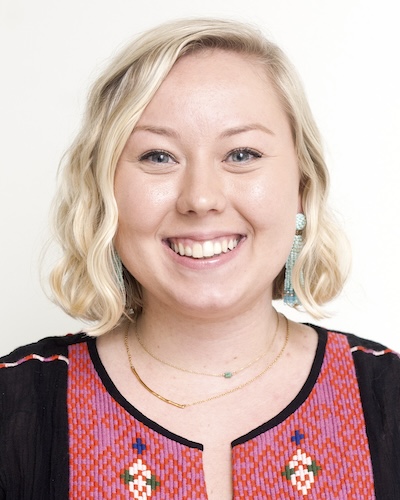
The 4 Thanksgiving Fs: Food, Friends, Football, and Family ⟩
November 21, 2017, by Caroline
Getting Involved Life Hacks
It might not be Thanksgiving quite yet, but the Thanksgiving spirit is definitely in the air (can you tell from Bryan and Ali’s posts?). Well, you lucky readers, here comes one more Thanksgiving appreciation blog!
This past weekend was filled with three of my favorite Thanksgiving occupations: food, friends, and football.
On Friday night, I journeyed out to a classmate’s house a couple hours outside LA for an early Thanksgiving with friends. It was truly one of the highlights of my semester. Let me tell you — the air was so fresh and I could see stars in the sky! I’ve definitely gotten used to big city life (and all of its perks) but it was a breath of (literal) fresh air to get out of the city for a night! We had a huge buffet of food, a fire pit, and so many laughs. It was a great chance to get together with friends who aren’t in my cohort and catch up!
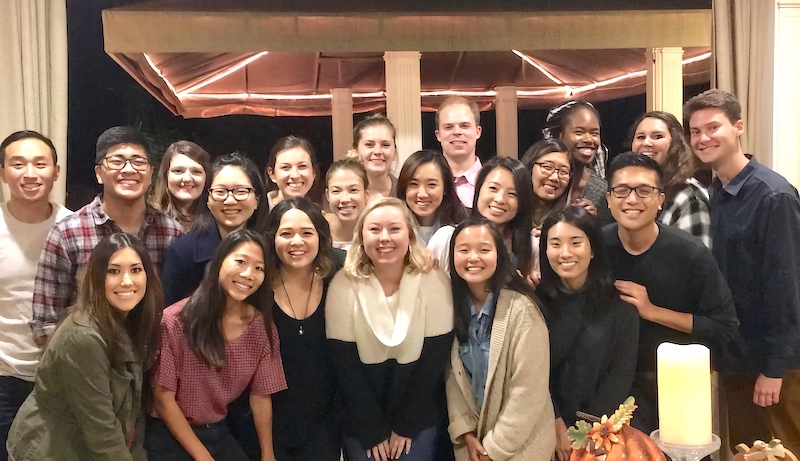
A food- and friendship-filled early Thanksgiving celebration with wonderful friends from the program.
On Saturday, I went to the USC vs. UCLA football game. Our OT programs were actually being recognized at the game, so a big group of us got to go onto the field for a photo op before warm ups. Definitely a different view than the one I’m used to from the student section! We were also featured on the screen during the game — how cool right?! After the photo op, I went to the OT and Physical Therapy tailgate (gotta love the interprofessional mixing!) before heading to the game (which we won!!). Go Trojans!
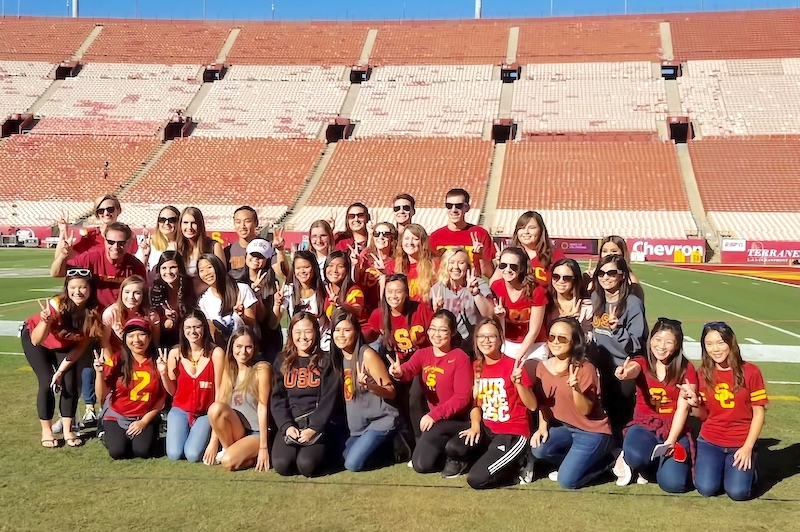
Here’s the picture of our whole group out on the field. Check out those V’s for victory!
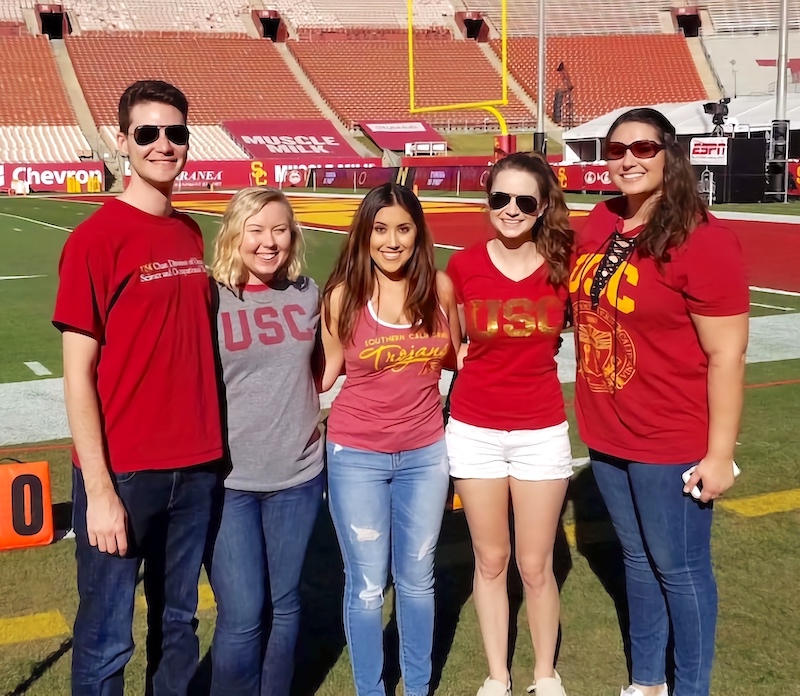
Another photo from our experience on the field!
Food, Friends, and Football — it was definitely a fun weekend. “And the last F?” my detail-oriented readers might ask. Family time is coming soon! In fact, I’m writing this from none other than LAX airport waiting to board my flight back home to North Carolina. As I was packing my sweaters and winter clothes and gearing up for colder weather back on the East Coast, I jokingly texted my mom that I’d rather stay in LA for 90 degree Thanksgiving weather. She knew exactly what would convince me to come home — pictures of my dogs that are (almost) as excited for me to come home as my human family. Guess I could add one more F to my list of Thanksgiving words: fluffy pups. Photos of the pups included to increase the cuteness factor of this blog post:
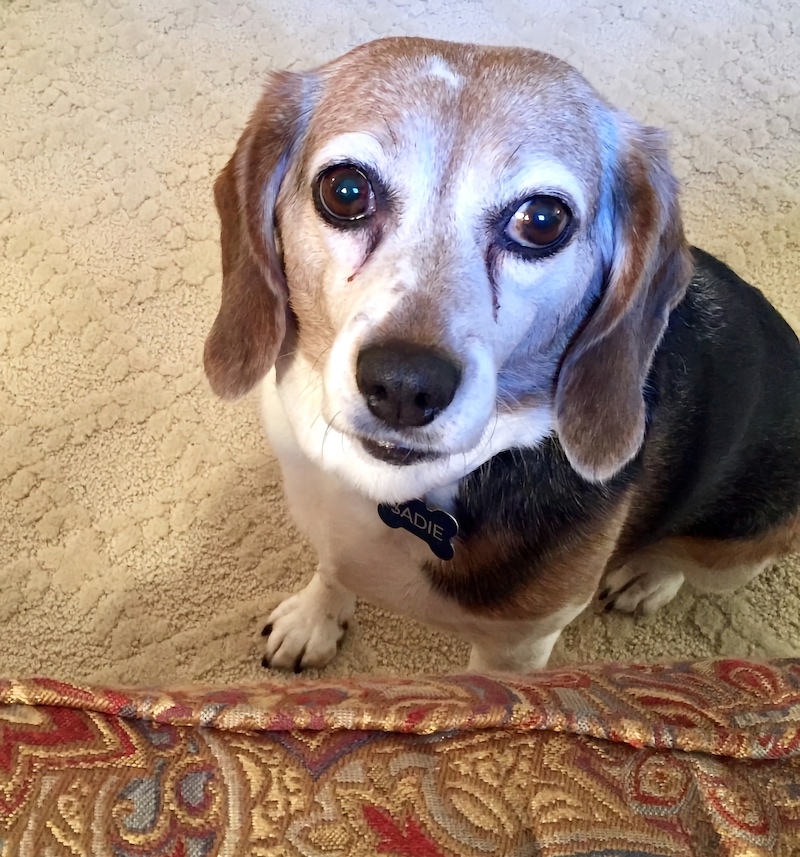
Meet Sadie, who is very excited to lounge with me on the couch. Look at those needy eyes!
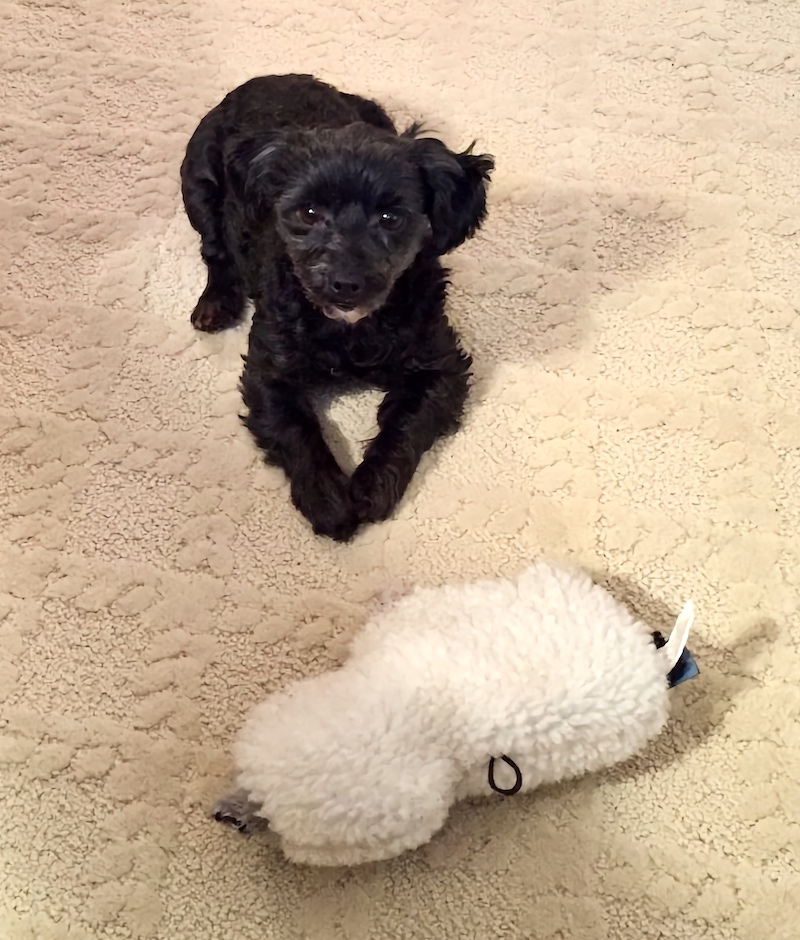
Meet Gracie, who is excited to have another human at home to play with her!
Looking forward to a few days off from school before heading back for the last week of classes and final exams. Happy Thanksgiving to all!
⋯
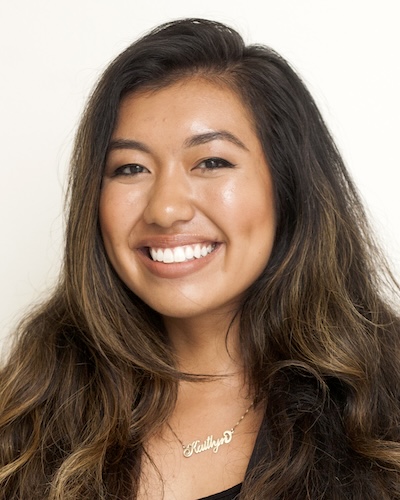
What it Means to be an OTAC Student Delegate ⟩
November 21, 2017, by Kaitlyn
Getting Involved
I have been asked what I do as an Occupational Therapy Association of California (OTAC) Student Delegate quite frequently and I don’t blame people for asking. I will admit that it is a bit elusive, and that is because it is a very multi-faceted role with a lot of “behind the scenes” work.
Becoming an OTAC Student Delegate through USC’s OT program begins with an Executive Board Occupational Therapy and Science Council (OTSC) election process. After elected, there is an application and letter of recommendation process as well. Once these steps are complete, you can begin your role as an OTAC Student Delegate!
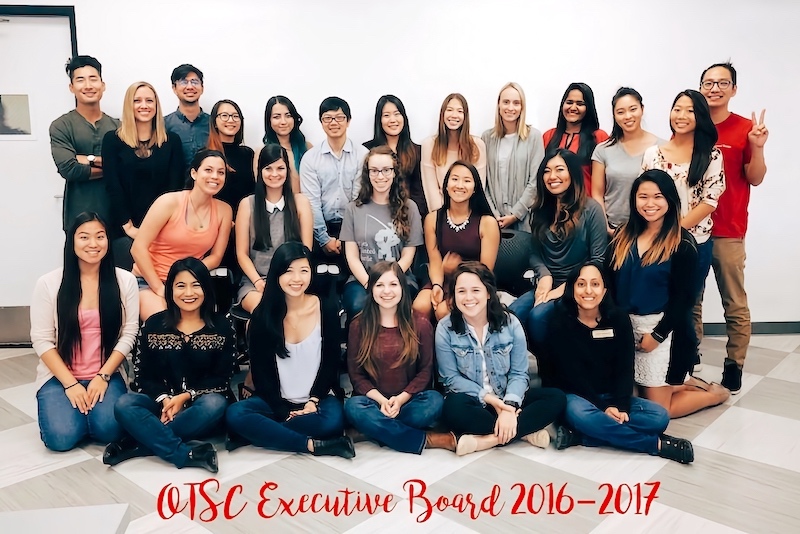
USC OTSC Executive Board 2016-2017
There are many derivatives that come out of the OTAC Student Delegate role. I function as an integral member of the OTAC Student Leadership Committee and a liaison between our program and OTAC. I also help plan and organize events in collaboration with OTAC and participate in conference calls and meetings with our committee co-chairs and other students from different OT programs in California.
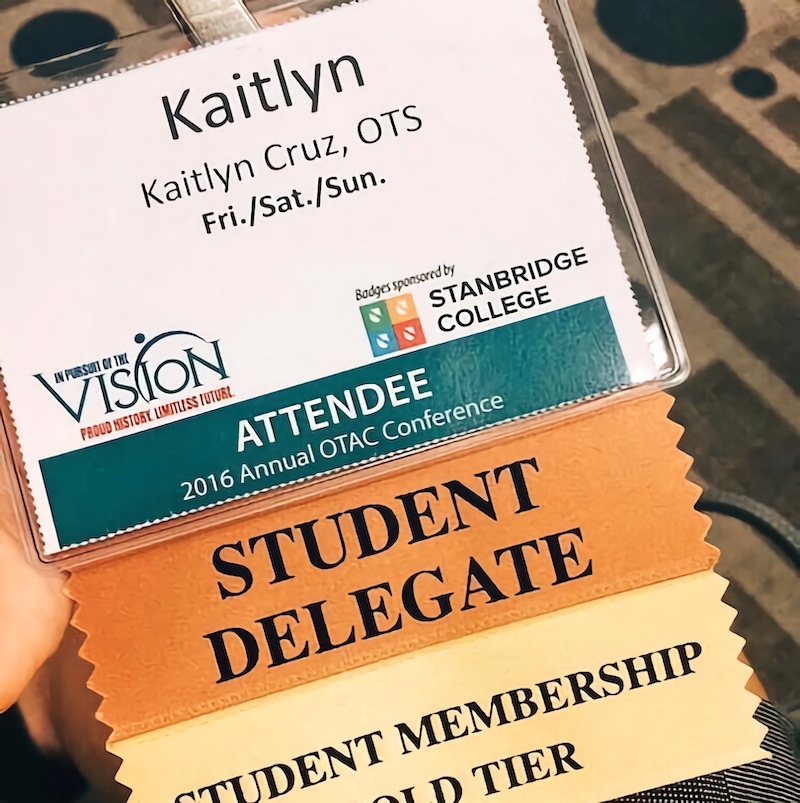
Out of all the things that I am expected (and love) to do, being able to help plan and organize events is my favorite. For example, one of the events we have is called ‘Afternoon Tea with a Scholar.’ Last year’s 15th Annual Afternoon Tea with a Scholar featured Ann McDonald, MA, PhD, OTR/L (and USC alum!), who spoke about the dynamic role of OT in support of families due to the difficult task of meeting the needs of a family member who has a physical, emotional, or neurodevelopmental challenge. At this event specifically, I served as a student representative, introduced myself to all OTAC members and supporting guests, and helped with setup and cleanup of the entire event.
Another event that I thoroughly enjoy is our annual Legislative Reception. The Legislative Reception provides a forum for OT practitioners to interact with legislators and their staff about health care issues that OTs are facing. This event provides an opportunity for our profession to dialogue about the changes we want to see, advocate for the profession, and discuss key issues in healthcare. This event required a lot of preparation beforehand with weekly committee conference calls and also being proactive about communicating with legislators around the Southern California area.
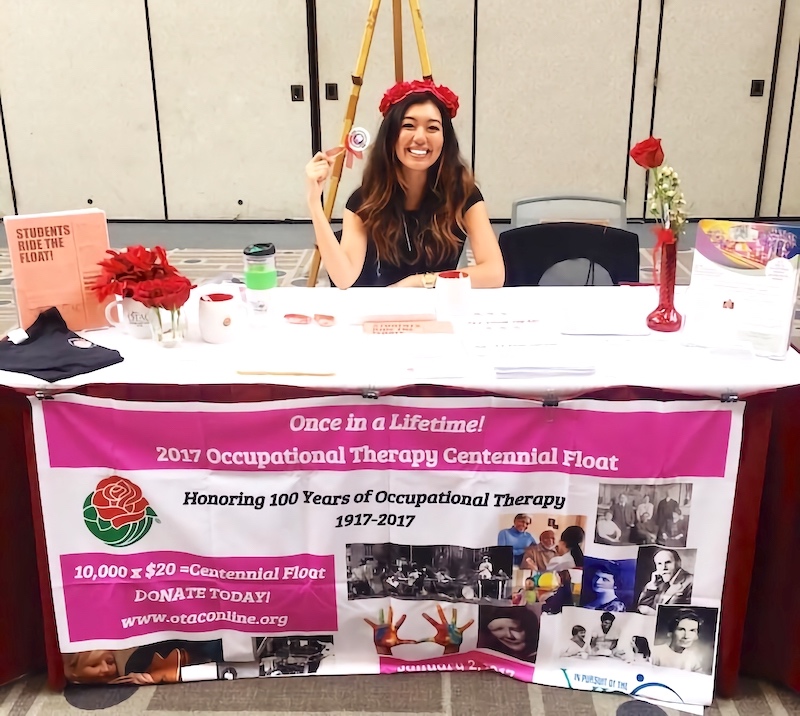
Working at the Rose Parade Float Booth at OTAC Conference 2016
Our biggest events, of course, are the OTAC Annual Conference (which was in Pasadena last year, Sacramento this year) and OTAC Spring Symposium (which was in San Diego in the spring). At these events, I have helped run the student track by organizing and facilitating the Q&A panel, facilitating the social mixer, introducing speakers, serving as a room monitor, and so much more. At last year’s OTAC Annual Conference, I also worked the OTAC Rose Parade Float Booth to help fundraise money for our float that was featured in the 2017 Rose Parade. In that weekend alone, we raised more than $6,000!
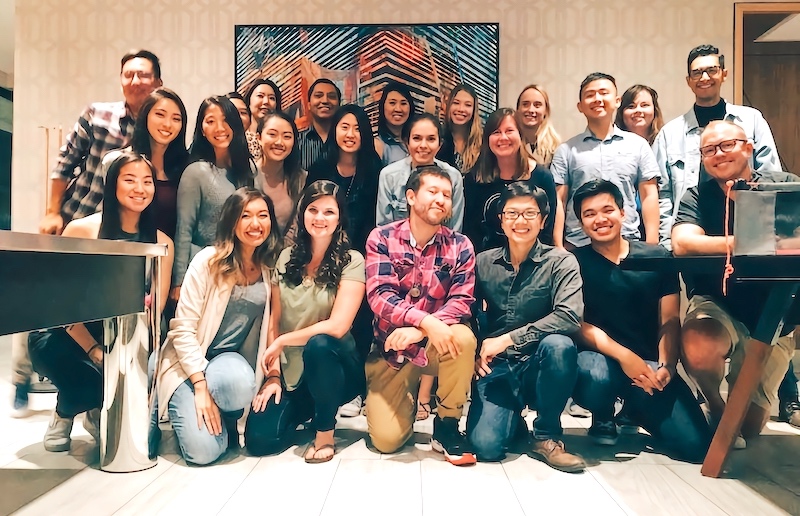
Our new USC OTSC Executive Board 2017-2018!
Overall, I’ve grown so much professionally and personally through this role.The biggest lesson I’ve learned in this specific journey is to always take a chance (when appropriate, obviously) and go towards things even without knowing the outcome. I went into the initial OTSC Executive Board election with hopes, but no expectations. Because of this, I have found my time being an OTAC Student Delegate so much more rewarding and have been so much more grateful for the opportunity.
⋯
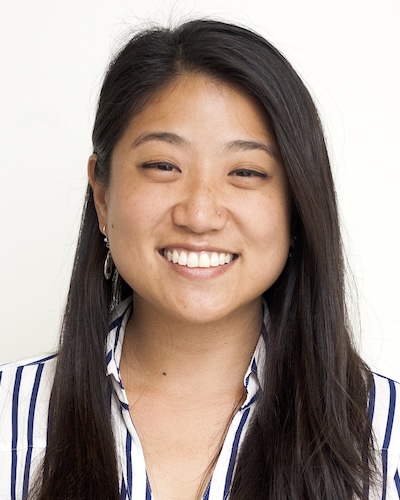
USC’s Student Run Clinic: Providing Care to the Underserved in Skid Row ⟩
November 13, 2017, by Erika
Getting Involved
One of my top 3 enriching experiences in this program didn’t take place in the classroom and wasn’t at fieldwork. It was in a men’s shelter located in the middle of Los Angeles’ Skid Row. It was here where I met Ben*, a man who was living at the shelter that came to see us at the Student Run Clinic because he was complaining about itchiness on the bottom of his feet.
Hold up, what is Student Run Clinic?
Student Run Clinic is a student run organization that provides comprehensive healthcare to the homeless, chronically ill, and underserved populations in Skid Row. We work in an interprofessional team alongside students from USC’s Medicine, Physician Assistant, and Pharmacy programs operating two clinics monthly — one at John Welles CH (JWCH), a Federally Qualified Health Center (FQHC) one Saturday morning a month as well as a mobile clinic that operates out of a men’s shelter on one Tuesday evening a month.
Gotcha, back to Ben.
Ben came to see us on a Tuesday evening in which we set up shop in the men’s shelter he was staying at. As part of the clinic protocol and as the OT student, I was the first to greet Ben and introduce him to what he was going to experience throughout the course of the night. I then gathered his social history — asking him questions about life before living in the shelter, how he occupies his time during the day, if he has plans for what’s next, who his support system is, what his current employment status or past employment history is, etc. We got to talking and because clinic was running a little slow, I had time to chat him up more than usual.
Ben was a biking barber. He spent his days making money cutting hair biking across Downtown Los Angeles and was proud of it. A couple weeks before I met him, he had traveled to a bike race in Northern California and during that time, his landlord rented out the apartment he was living in without telling him leaving him homeless when he came back to Los Angeles. Thus, his current situation of living in the shelter. Despite these setbacks, Ben was upbeat in demeanor — honoring the hustle, doing what he can do to work as much as he can, confident and capable. I really enjoyed meeting him. I asked all my curious questions about being a biking barber and he asked me about being a student. ::knock knock knock:: My time was up.
After I left the room, I briefly summarized what I learned to the team (2 med students, 1 pharm student, and 1 PA student). It was there turn now to go in and ask their questions specific to their specialties. Med and PA took Ben’s vitals and administered the physical exam on his feet. Pharmacy inquired about any current medications he was taking, whether he was satisfied with those medications, if the medications affect the itchiness on his foot, etc. :: knock knock knock:: Their time was up.
While Ben was speaking with the other students, I was busy consulting our faculty preceptor, Dr. Pitts about everything I learned about him to work through the case. She helped me clinically reason through the case and ensure we have all the information we need to inform the team on a potential treatment recommendation. At the time when I met Ben, Dr. Pitts proctored both clinics but now Dr. Erin McIntyre has taken over mobile clinic and Dr. Pitts focuses on Saturday clinics at JWCH. If there’s anything I can be grateful for in volunteering and serving on SRC board, it’s the unwavering guidance and experience of our faculty mentors.
Once all the other students returned from speaking with Ben, we engaged in “the Huddle” — the point in the night where we share all the information we learned about the patient and as a team, create a problems list and potential treatment plan accordingly. Once this was agreed upon, our attending physician, Dr. G, came in to hear us present all of our findings. As an educator and mentor, Dr. G provided us with feedback, constructive criticism on where we may have had some holes in our questioning or evidence, and a cohesive understanding of any next steps.
While Ben was a rather simple case of determining whether he had dry skin or a fungal infection, the experience was so much more than that.
- I was able to listen to Ben’s story firsthand and gain a tiny ounce of understanding of his experience living in Skid Row.
- I thought critically in an OT lens and assessed his living conditions, daily occupations, and motivation to inform us about his foot and skin condition and his ability to follow through on treatment.
- I was able to make new friends in other professions, delve into each others healthcare lens, and understand how each profession contributes to a primary care model.
- Lastly, I was able to advocate for Ben in providing the other health care professionals insight into Ben as a human outside of being a patient.
Being a part of Student Run Clinic has been a true privilege and one I would never pass up for anything in this program. It’s an experience that is unlike any other and if you’re currently a student in any of USC’s programs (Medicine, Physician Assistant, Pharmacy, or Occupational Therapy), I would encourage you to volunteer. You won’t regret it.
*All names mentioned in this blogpost are pseudonyms.
⋯

OTAC in Sac: Attending the 2017 OTAC Annual Conference ⟩
October 25, 2017, by Kaitlyn
Getting Involved
This past weekend, I had the privilege of attending our annual Occupational Therapy Association of California (OTAC) Conference in our state’s capital, Sacramento. This year we are celebrating 100 years of OT, so naturally, this conference was going to be a big celebration. In even more exciting news, this year we had over 80 Trojans presenting and speaking and 8 receiving awards! It was very humbling to be among fellow USC students and alumni who had put in so much hard work to be where they are now.
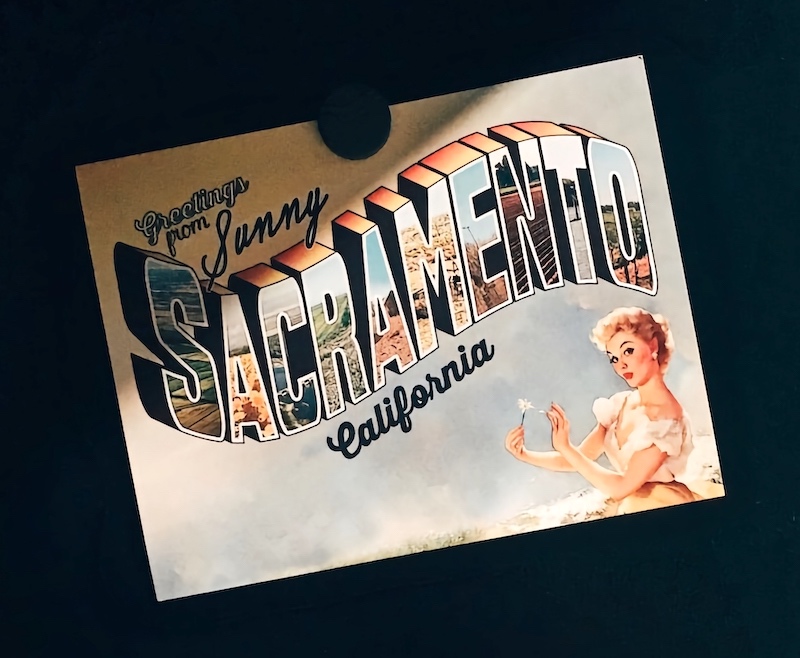
At this particular conference, two of my favorite sessions were coincidentally presented by faculty from USC. One of the sessions I attended was titled, “Positive Psychology and Meditation: Clinical Applications and Beyond!,” which was facilitated by Dr. Don Gordon. In this session I learned about the supporting evidence of positive psychology, research related to the effectiveness of meditation (including neurobiology and how it builds psychological coping skills), how to engage in exercises like meditation as a form of coping (which can be applied to patient interventions if appropriate!), and so much more.
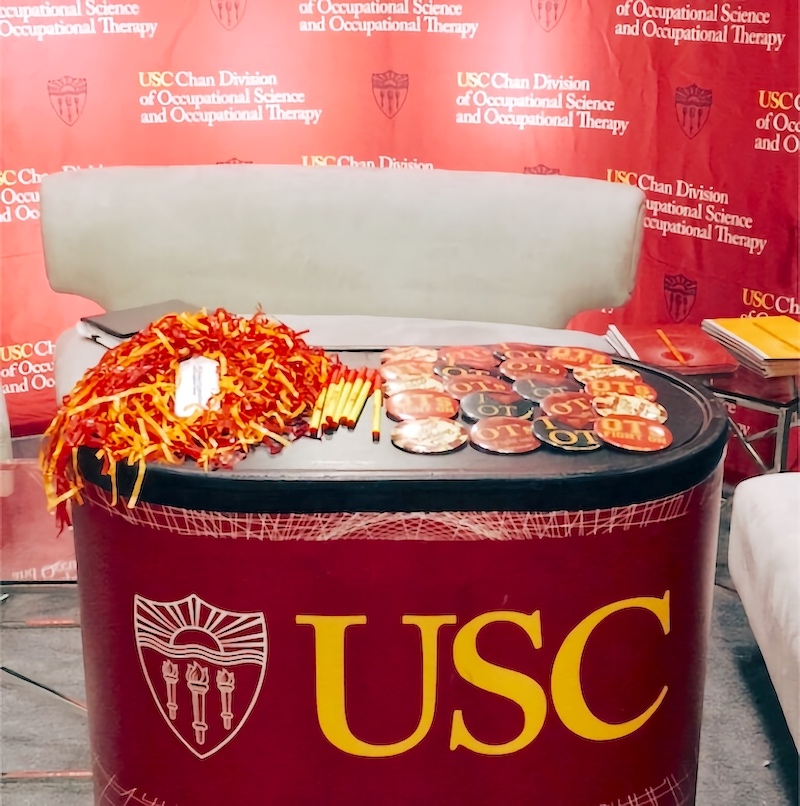
A sneak peek of USC’s booth at Exhibit Hall!
Another one of my favorite sessions was titled, “The Shared Governance Model of Participatory Decision-Making: An Opportunity for the Development of Occupational Therapy Leadership, Power, and Voice,” which was led by Dr. Katie Jordan, Dr. Samia Rafeedie, and Dr. Bryant Edwards. In this session, I learned about the importance of “shared governance,” which is an organizational structure that enlists participatory decision-making models of leadership. For example, we discussed the importance of involving front-line staff (e.g., nurses) in making decisions so that they too feel empowered, appreciated, and respected.
When I was not in sessions, I was working either at our USC Exhibit Hall Booth (as a part of my Student Ambassador role) or completing any OTAC Student Delegate tasks that were needed of me (as a part of my OTAC Student Delegate role). It was definitely a busy weekend, but it was EXTREMELY rewarding and wouldn’t have had it any other way.
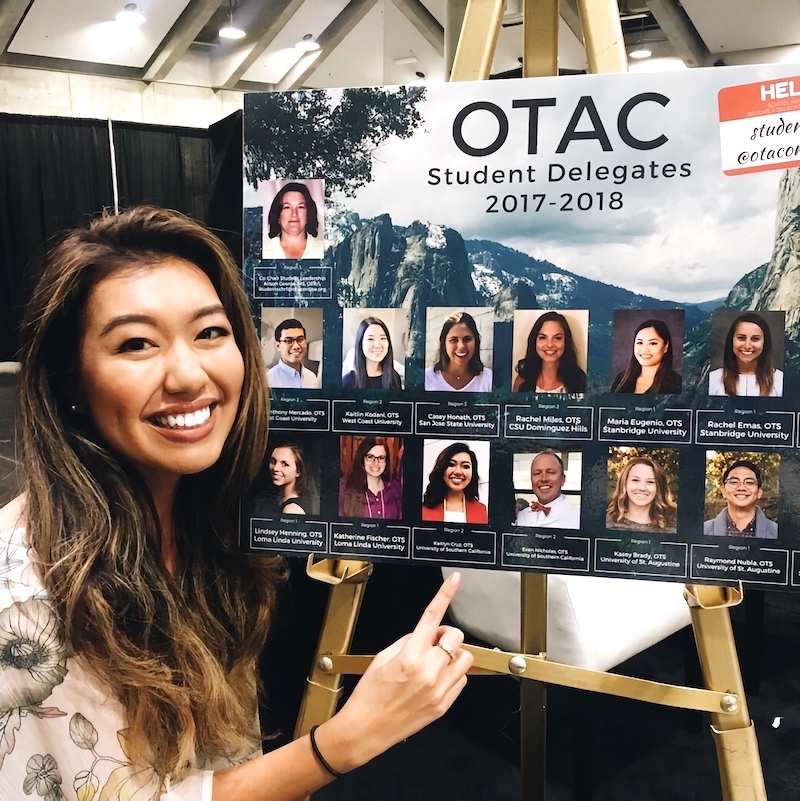
The other student delegates across California and I were featured on this poster board at conference!
On Saturday, the Keynote Speaker at the Awards Ceremony was none other than Frank Kronenberg, who is the director and co-founder of Shades of Black Works, a Cape Town-based social enterprise with a triple social mission: strengthening places of origin, forging connections, and supporting collective story-making. Kronenberg is also a prominent global activist and the co-founder of the movement “Occupational Therapists without Borders.” Frank Kronenberg’s speech, which was about humanizing praxes and its relation to OT, was nothing short of inspiring. I may or may not have shed a tear (or two . . . or three . . .) during it. At the end, he proposed that we modify Mary Reilly’s infamous statement, “Man through the use of his hands as they are energized by mind and will, can influence the state of his own health” to the following: “Humanity, through joining hands, as energized by ubuntu and political will, can influence the health of the human condition.”
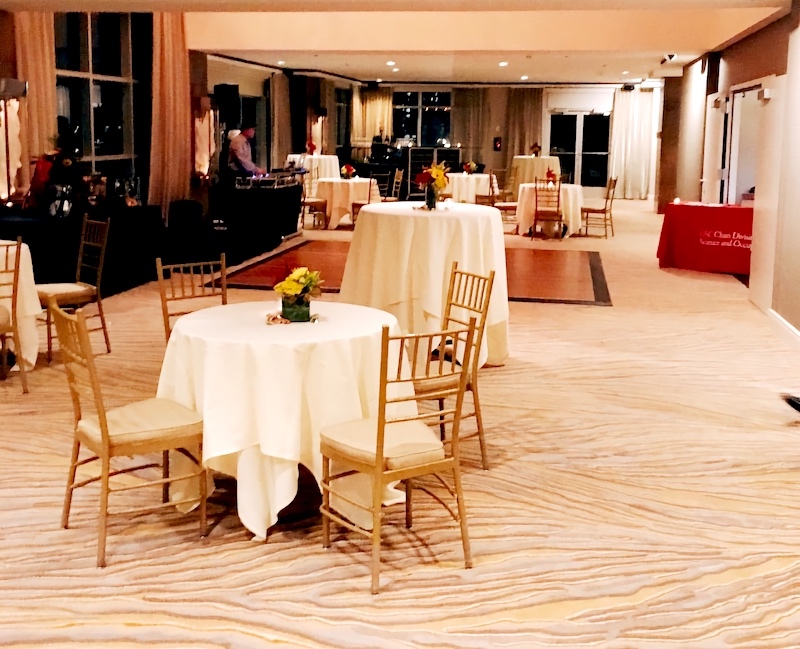
Setting up for the fun Trojan Family Reception on Saturday night!
Overall, I can confidently say that attending conferences like OTAC is what revitalizes and recharges my soul in my own OT journey. Being surrounded by so many kind, accomplished, and hardworking occupational therapists inspires me to be better and do better not only in the realm of OT, but also in life in general.
⋯
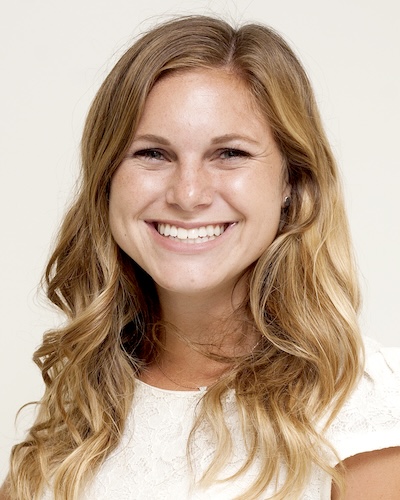
More Than Just Classes: Interprofessional Geriatric Curriculum Program ⟩
October 16, 2017, by Ali
Getting Involved
As part of our course curriculum in the second year, all three cohorts take OT 538: Current Issues in Practice: Adulthood & Aging. This course addresses the shifting demographics of society with the worldwide phenomenon of aging and occupational therapy’s role in caring for the aging population. One option for this course is to engage in an interdisciplinary experience with USC students in other fields of study, which include: pharmacy, dental hygiene, social work, medical, physician assistant, physical therapy, and occupational therapy students! One aspect that drew me into occupational therapy was the potential for interdisciplinary collaboration and community outreach, which this program blends together seamlessly, so I was eager to sign up.
We had our first site visit this week where we prepared for an hour before meeting with our older adult living in the residential community building. The focus of the week was on pharmacy and social work as well as to generally get to know our older adult. My interprofessional team does not include a social work student or a pharmacy student, so the other healthcare professional students and I stepped up to coordinate our session in a collaborative way. We ensured we remained within our respective scopes of practice while also obtaining all the information we needed. The older adult that we get to work with is so welcoming and open about her life.
The different professional students on my team and I took turns asking various questions, about everything from her family, where she is from, what she did for a living, and what she currently does with her time. She was open about her medical history, concerns about age related illness due to family history of diabetes and Alzheimer’s. She showed us photos of her grandchildren and years of travel. She opened up about her peers and how she views aging as something she is in control of by maintaining a social life, physical activity, and engaging in activities that give her life meaning (occupations!).
After the session we debriefed as a team and it was amazing to hear all of the different things that each professional student found significant and would affect their treatment or intervention, if we were to treat our older adult. The physician assistant and the medical student found the vitamins that our older adult is taking to be a great fit for her and her needs. The dental hygienist student noticed a tooth that she was in between appointments on getting it fixed. The physical therapy student noticed bruises on her knees and handles on the walls, which lead her to want to know more about her balance. I wanted to know more about her roles, routines, and habits in order to get a better idea of how she occupies her times.
I love the chance to get to ask each of these different students questions to learn more about their professional lenses as well as the chance to connect with an older adult. Being a student at USC opens the door for opportunities such as this with so many other professional programs and connection to the community. The Trojan family spreads into all of the schools within the university and community members. I look forward to my next site visit to continue my interprofessional growth and building a relationship with our older adult.
⋯





